
Eremiaphilidae is a small Old World family of praying mantids, based on the type genus Eremiaphila. As part of a major revision of mantid taxonomy, this family now contains the subfamily Tarachodinae, which includes tribes and genera previously placed in the now obsolete Tarachodidae.

Hymenopodidae is a family of the order Mantodea (mantises), which contains six subfamilies. Some of the species in this family mimic flowers and are found camouflaged among them; these are called flower mantises. Their coloration is aggressive mimicry, luring prey to approach close enough to be seized and eaten.

Hymenopodinae is a subfamily of the mantis family Hymenopodidae.
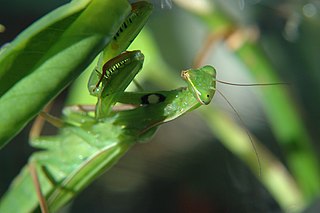
The genus Mantis is in the family Mantidae, of the mantis order Mantodea.

Archimantis is a genus of praying mantis found in Australia. These species are ranging from 150 mm to 180mm, and can be quite aggressive when full adult.

Rhombodera is a genus of praying mantises native to Asia and possessing common names such as shield mantis, hood mantis, and leaf mantis because of their extended, leaf-like thoraxes.
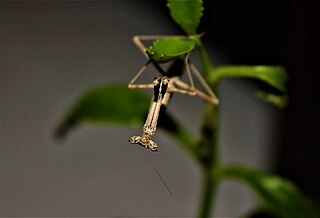
Oxyothespis is a genus of praying mantis in the family Toxoderidae. Members of this genus have been called grass mantises.
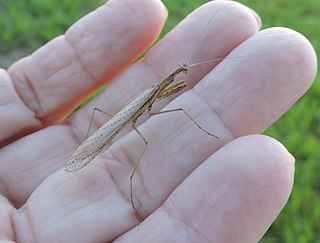
Thespidae is a family of Neotropical insects in the order Mantodea. Following a major revision of this order in 2019, the old-world subfamilies Haaniinae and Hoplocoryphinae, previously placed here, have been upgraded to family level.
Toxoderidae is a family of praying mantises.
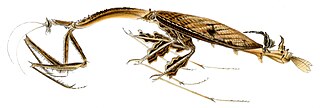
Toxodera is the type genus of mantids in the family Toxoderidae and tribe Toxoderini; species are native to South-East Asia.
Nemotha is a genus of praying mantids in the family Hymenopodidae: tribe Anaxarchini, containing a single described species, Nemotha metallica. The genus was previously placed in the Iridopterygidae, and two species have been placed in the revived genus Tricondylomimus.. It is found in Asia.

Hapalopeza is an Asian genus of praying mantis in the family Gonypetidae. Two species, previously placed here, are now in the genus Spilomantis.
Phyllothelys is an Asian genus of praying mantids in the family Hymenopodidae: subfamily Phyllothelyinae.

Leptomantella is a genus of praying mantids and typical of the new (2019) family Leptomantellidae. Species have been recorded from Asia.

Humbertiella is an genus of praying mantids in the subfamily Gonypetinae found in Asia.
Ambivia is a genus of praying mantids in the subfamily Acromantinae and the tribe Acromantini; species distribution records include Indo-China.
Rhombomantis is a genus of mantids in the family Mantidae. There are at least four described species in Rhombomantis.

The Hierodulinae are a subfamily of praying mantids, originally used by Brunner von Wattenwyl. It was restored as part of a major revision of mantid taxonomy, and now contains genera previously placed elsewhere in the family Mantidae.

The Gonypetidae are a new (2019) family of praying mantids, based on the type genus Gonypeta. The first use of "Gonypetidae" was by Westwood and it has been revived as part of a major revision of mantid taxonomy; the subfamily Iridopteryginae having been moved here from the obsolete family Iridopterygidae. The Gonypetinae include Asian genera transferred from the obsolete taxa Amelinae and Liturgusidae.
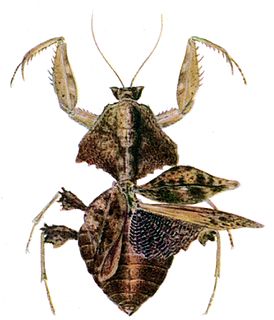
The Majangidae are a revived (2019) family of praying mantids from Madagascar.















